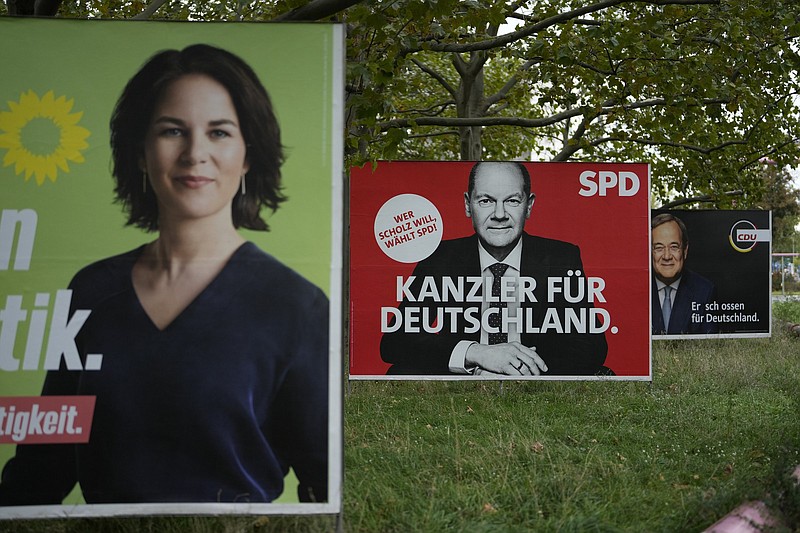BERLIN -- German voters have heard all the pitches on who should replace Angela Merkel and finally approach their historic choice today: paving the way for a new chancellor after her 16-year tenure and shaping both the country's politics and wider European affairs.
[Video not showing up above? Click here to watch » arkansasonline.com/926merkel/]
As candidates embarked on final campaign efforts, the razor-tight race was simply too close to call. With the 67-year-old Merkel deciding not to run for reelection, the election marks the first in Germany's postwar history in which a chancellor isn't in the mix as an incumbent.
"It's definitely a nail-biter of an election," said Sudha David-Wilp, deputy director of the German Marshall Fund's Berlin office. "It's a change election not just for Germany, but for Europe and therefore the whole world," she said, citing the amount that the outgoing chancellor of a decade and a half has elevated Berlin's role in international politics.
The chancellery appears within the reach of two men, both in their 60s, who represent the country's two most established parties.
The first is Olaf Scholz, 63, from the center-left Social Democrats, who has tried to present himself as Merkel's natural successor following a stint in her latest coalition cabinet as finance minister and vice chancellor. His dry and technocratic political style might just have won him over to Germans looking for a steady hand.
There is also Armin Laschet, 60, the candidate for Merkel's Christian Democrats and its smaller sister party. The leader of Germany's western state of North Rhine-Westfalia, Laschet has run a gaffe-prone campaign and is unpopular with voters, but has the benefit of a more robust center-right support base behind him.
Laschet has edged closer to Scholz in the polls in recent days. The Forsa polling firm on Friday projected Laschet's bloc will get 22% of the vote, compared with 25% for Scholz's Social Democrats -- putting the lead position within the margin of error.
The German Greens, whose campaign has been led by 40-year-old Annalena Baerbock, were predicted to come in with 17%, according to the poll.
Many Germans remain unsure of whom to vote for.
The center-left Social Democrats won the majority in 2017, and voters like Christian Gottschling, a 49-year-old lawyer, have been less swayed by dire warnings over a left-leaning coalition.
"We need a change," he said. "I'm not hugely hopeful that it will be a big change, but at least a step in the right direction for the future."
Michael Schonherr, 42, a business consultant from Potsdam, said he wasn't satisfied with any of the choices and was voting for "the least bad one," but did not want to say how he was casting his ballot.
He criticized the Christian Democrats, whom he's voted for before, for campaigning on fear of the left rather than its own ideas.
"It's harder to decide this time," he said.
Whoever comes out on top will first face the challenge of putting together a governing coalition.
No party is expected to win a majority in parliament, meaning that at least two -- and possibly three -- parties will need to band together to create a coalition government. That could mean long talks, and Merkel will remain leader as it plays out.
Germany has "never had such a fragmented party landscape, with so many parties being so close in the polls," said Isabelle Borucki, a political science professor who teaches at the University of Siegen.
When the shape of the government is clear Merkel's successor will then have to attempt to steer Germany and Europe through myriad challenges. Those include foreign policy decisions on how to balance trade interests with Russia and China with concerns about expansionism, human rights and destabilizing activities such as hacking.
At home, there will be the question of whether Germany should continue borrowing to invest in infrastructure and digitalization, an issue that has come to the fore during the pandemic as the country's weaknesses have been exposed.
But constrained by coalition politics, governing will be difficult, said Rudiger Schmitt-Beck, a politics professor at Mannheim University.
"There will be a trend toward immobilism, toward lame compromises, toward not resolving problems," he said. "The ability of the system to tackle the challenges it faces will be weakened."
